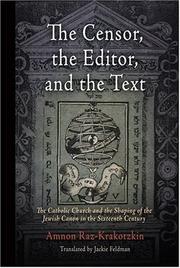| Listing 1 - 7 of 7 |
Sort by
|
Book
ISBN: 2358721417 Year: 2007 Publisher: Paris (64 Rue Rebeval 75019) : La Fabrique Éditions,
Abstract | Keywords | Export | Availability | Bookmark
 Loading...
Loading...Choose an application
- Reference Manager
- EndNote
- RefWorks (Direct export to RefWorks)
Comment la conscience sioniste a choisi d'occulter les 2000 ans d'exil depuis la destruction du Second Temple, pour remplacer la figure malingre du juif diasporique par celle, vigoureuse et fière, du juif nouveau – l'Israélien ; comment a été créée, contre toute évidence historique, la notion de peuple juif et comment le sionisme voit le « retour » de ce peuple dans l'histoire ; pourquoi le sionisme laïque est en fait fondé sur des bases théologiques, messianiques ; comment le mythe de « la Shoah et la renaissance », nouvelle version du mythe de la rédemption, oppose lui aussi l'État d'Israël au juif exilique ; comment la catégorie du « retour » – au pays, aux origines, à une existence juive authentique – illustre elle aussi la négation de l'exil ; pourquoi la laïcité version israélienne est une forme de l'orientalisme selon Said : telles sont quelques unes des questions éclairées par ce livre, dont on peut dire, en paraphrasant Walter Benjamin, qu'il brosse à contresens le poil luisant de l'histoire. De grandes figures de la pensée juive – Gershom Scholem, Hannah Arendt entre autres – sont convoquées pour introduire un thème central du livre : la pensée binationale. Pour Amnon Raz-Krakotzkin, il ne s'agit pas de proposer une solution politique plutôt qu'une autre, mais de montrer la voie pour en finir avec la pensée de la séparation. La position binationale va de pair avec la critique de la négation de l'exil. Elle propose une autre image de la culture juive, qui s'appuie précisément sur des sources exiliques. Elle indique les conditions d'une véritable laïcisation, c'est à dire la distinction entre l'identité juive nationale et un État enfin débarrassé de toute signification messianique. C'est une façon nouvelle d'envisager l'existence juive en Israël, qui n'oblige pas à nier l'histoire du pays ni à déposséder les Palestiniens. « La vision binationale est la seule conception porteuse d'avenir, qui prend en considération les opprimés dans une orientation égalitaire et dessine le contexte nécessaire pour échapper à la catastrophe. »
Jewish --- Religion and state. --- Zionism and Judaism. --- Arab relations.

ISBN: 0812240111 9780812240115 Year: 2007 Publisher: Philadelphia University of Pennsylvania press
Abstract | Keywords | Export | Availability | Bookmark
 Loading...
Loading...Choose an application
- Reference Manager
- EndNote
- RefWorks (Direct export to RefWorks)
Censorship --- Expurgated books --- Judaism --- Religious aspects --- Christianity --- History --- Relations --- Catholic Church
Book

ISBN: 9780812291513 Year: 2015 Publisher: Philadelphia
Abstract | Keywords | Export | Availability | Bookmark
 Loading...
Loading...Choose an application
- Reference Manager
- EndNote
- RefWorks (Direct export to RefWorks)
Multi

ISBN: 9780812291513 9780812247275 Year: 2015 Publisher: Philadelphia, Pa University of Pennsylvania Press
Abstract | Keywords | Export | Availability | Bookmark
 Loading...
Loading...Choose an application
- Reference Manager
- EndNote
- RefWorks (Direct export to RefWorks)
Digital

ISBN: 9783110922172 9783484570047 Year: 2012 Publisher: Tübingen Max Niemeyer Verlag
Abstract | Keywords | Export | Availability | Bookmark
 Loading...
Loading...Choose an application
- Reference Manager
- EndNote
- RefWorks (Direct export to RefWorks)
Book

ISBN: 9780231182966 0231182961 9780231182973 023118297X 9780231544481 0231544480 Year: 2018 Publisher: New York, NY
Abstract | Keywords | Export | Availability | Bookmark
 Loading...
Loading...Choose an application
- Reference Manager
- EndNote
- RefWorks (Direct export to RefWorks)
"This book deals with two very painful and traumatic events in Jewish and Palestinian history--the Holocaust and the Nakba. Both events, which differ in nature and in degree, have had a decisive impact on the subsequent history, consciousness and identities of the two peoples. The Holocaust has become a central component of Jewish identity, particularly since the late 1970s and the 1980s, in Israel and around the world. The Nakba and its persisting consequences have become a crucial part of Palestinian and Arab identities since 1948. For the Palestinians, the Nakba is not merely about their defeat, their ethnic cleansing from Palestine and the loss of their homeland, nor even about having become a people most of whom live as refugees outside their land, and a minority living under occupation in their own land. The Nakba also represents the destruction of hundreds of villages and urban neighborhoods, along with the cultural, economic, political and social fabric of the Palestinian people. It is the violent and irreparable disruption of the modern development of Palestinian culture, society, and national consciousness. It is the ongoing colonization of Palestine that continues to the present through colonial practices and polices like Jewish settlements, illegal land acquisition, and the emptying of villages"
Arab-Israeli conflict --- Collective memory --- Holocaust, Jewish (1939-1945) --- Palestinian Arabs --- Population transfers --- Public opinion --- Refugees, Palestinian Arab. --- Historiography. --- Influence. --- Public opinion. --- Ethnic identity --- Palestinian Arabs. --- Israel --- Ethnic relations. --- Palestinian Arab refugees --- Collective remembrance --- Common memory --- Cultural memory --- Emblematic memory --- Historical memory --- National memory --- Public memory --- Social memory --- Memory --- Social psychology --- Group identity --- National characteristics --- Jewish-Arab relations --- Ethnic identity. --- Palestinian Nakba, 1947-1948.
Digital

ISBN: 9780231544481 9780231182966 Year: 2018 Publisher: New York, N.Y. Columbia University Press
Abstract | Keywords | Export | Availability | Bookmark
 Loading...
Loading...Choose an application
- Reference Manager
- EndNote
- RefWorks (Direct export to RefWorks)
| Listing 1 - 7 of 7 |
Sort by
|

 Search
Search Feedback
Feedback About UniCat
About UniCat  Help
Help News
News